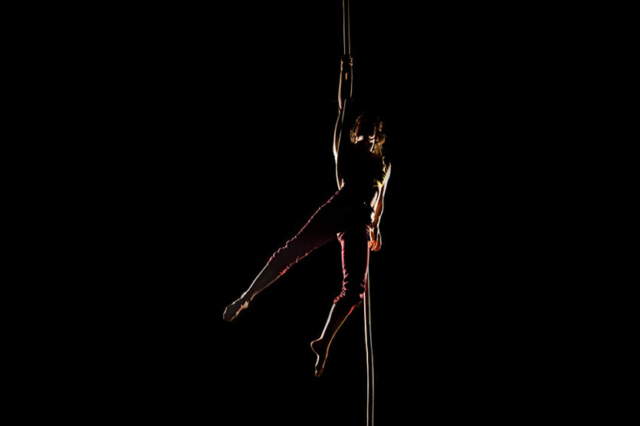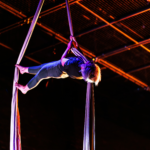
To Rosin or not to Rosin?
This is a hot topic! We get these types of questions all the time, from the perspective of aerialists, instructors, and studio owners.
“Should I use rosin?”
“Should I advise my students for or against it?”
“My studio doesn’t allow rosin at ALL. Is this normal?”
You may already have strong opinions about the matter. We’re not here to stand on a soap box one way or another, but we are happy to share our perspective on this (often) very heated discussion topic…..we have a lot to say about it!
Why would an aerialist choose to use rosin in the first place? Rosin is a grip aid and helps you and your students feel more confident and safe hanging from their hands.
❌Rosin off-limits❌
Now, let’s get into the buzz about studios banning rosin and why they’re doing it. The main concern we have heard that studios and instructors have is that using rosin can lead to dependency. When students become reliant on rosin, they may find it challenging to feel confident in the air without its assistance. In essence, it becomes a crutch that hinders the improvement of their grip strength.
Does this argument hold its weight? While we agree that it’s possible to overuse rosin and develop dependency, we also think it’s important to acknowledge that all bodies are different. We’ll say it again for the people in the back.
All bodies are different. This includes the skin that encases them! If you have dry hands, and you have cold hands (no sweat is going to come no matter how hard you work) then you will have slippery hands. And this is exacerbated enormously if you are training in a cool, dry environment. Some people have the opposite problem, where their hands sweat so much, the apparatus becomes like a slip ‘n slide. If working on bar apparatus this would be where you might use chalk, and sometimes people also use ‘dry hands.’
Ballerinas use rosin on the bottom of their ballet slippers to give them the desired amount of grip on the floor. Violinists rosin their bows to create the sound they want. A grip aid is just that, an aid, a boost, an enhancement. Just because someone has slippery hands, does not mean that they have weak grip. We allow grip aids in all our classes and retreats for this reason.
🌱How we like to use grip-aids
There is something to be said for grip aids becoming habit-forming. It’s easy to slip into the habit of applying rosin before every turn. This can become a sort of dependency, potentially based on some fear, but mostly habit.
We do like to be mindful of our rosin use (or any other grip-aid), and try to skip applying rosin before doing basic skills and conditioning. We feel that a little rosin, applied sparingly can go a long way IF you do have adequate grip strength.
Since grip strength is the core reason why some studios and teachers ban grip aids, let’s address how to strengthen grip in the first place. We shouldn’t solely focus on the hands and forearms; we need to look further up the arm to the shoulder. Studies have shown that a lack of grip strength can indicate injury or weakness in the shoulder girdle. So yet another reason to work on your prehab injury prevention shoulder exercises. Here is one of our favorites!
Serratus Shifting – Shoulder Stability Exercise
This video comes from our Remote Teacher Training. Did you know we have an hour long FREE Taster Course Available? If you’re interested in getting more of a sneak peek at the program, CLICK HERE
Spray Rosin vs. Dry Rosin?
Spray rosin can make you feel like spiderman, but sometimes it can make a film on your hands that becomes no longer sticky, making it so that you have to apply and reapply. We personally get more lasting results from dry rosin.
What about on ropes, ‘cause we can’t wash them?
Some covered rope owners do not let anyone on their rope with rosin. The claim is that it wears out the rope faster. Because spray rosin can leave a film, it can make a rope feel a bit gummy after copious amounts have been used on it over a substantial period of time. It may break down the rope cover eventually. But our suspicion is that the stickiness creates more friction on the apparatus and more tug on the textile and that is what causes the wear. We have no science to prove that point. However, from experience we have noticed that dry rosin on ropes will make your ropes more grip friendly but less sticky. So dry is our preference on equipment as well.

Rosin Allergies Anyone?
There are some studios who don’t allow rosin because one or more people in the community have an allergy. In our opinion, this is a totally valid reason to ban it from your studio. If this is the case in your studio, a good alternative is to spritz some water on your hands before climbing. (especially when training in a dry climate) Some other alternatives are to have designated apparatus, separate areas or rooms designated as rosin-free zones. (depending on the severity of the allergy of course)
Final thoughts
Using rosin is not cheating, and should not be mistaken for fly tape; it’s not merely sticking you in place. Instead, it prevents sliding so that you can focus on the skill at hand. Personally, we try not to rely on rosin by default, or out of habit, but use it strategically when it makes a difference between sliding and maintaining a secure grip, especially when working on more challenging skills.
Whatever your personal relationship to rosin, we believe it’s important not to stigmatize it. We can never know the personal and medical background of a person, including all the reasons why it might serve as an important resource.
Written by Sarah Holmes & Rain Anya – Co-artistic Directors | Paper Doll Militia
*Want to be notified any time we publish a new blog? Sign up for our mailing list and become a part of the Paper Doll Fam!





